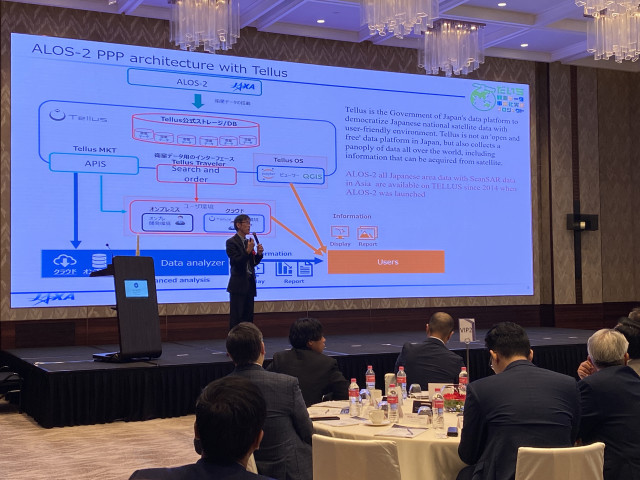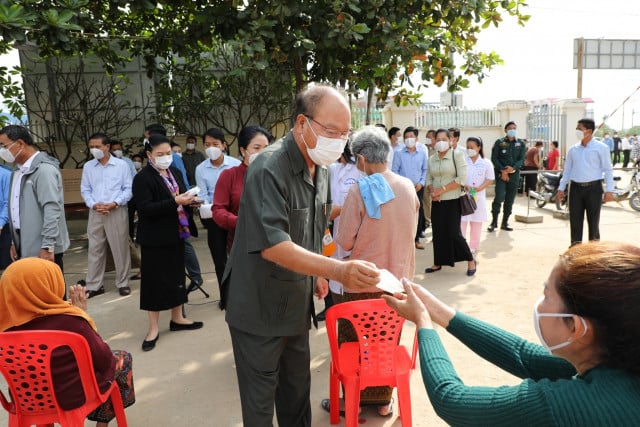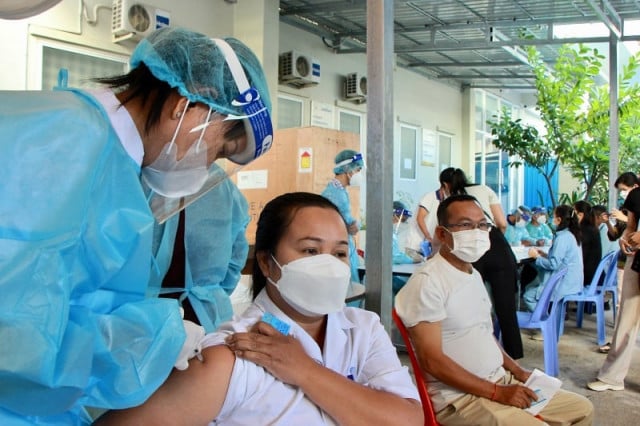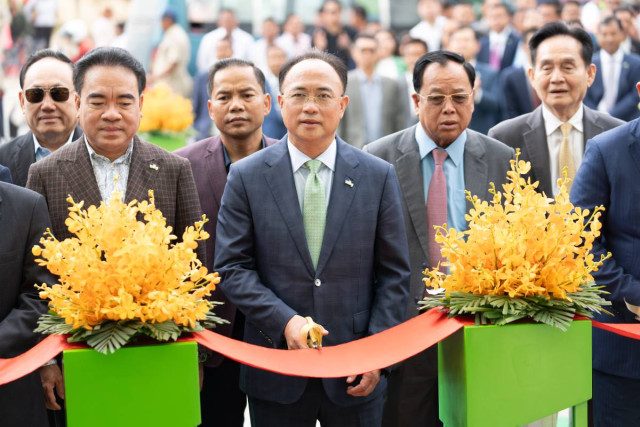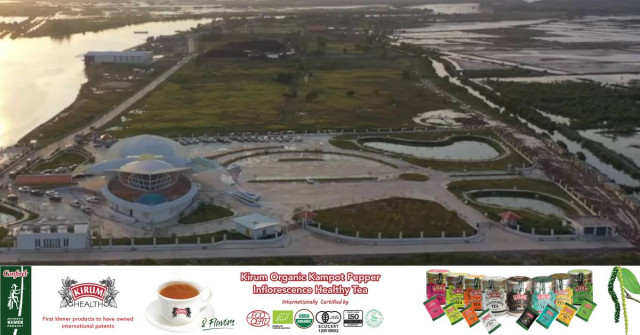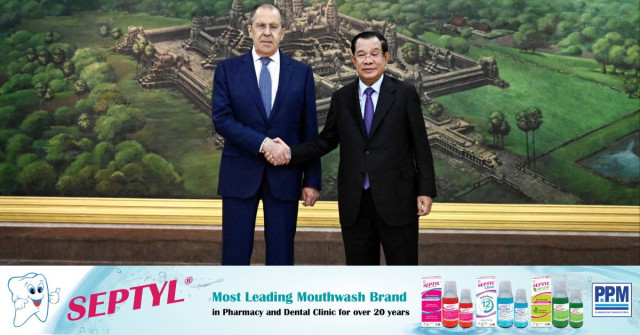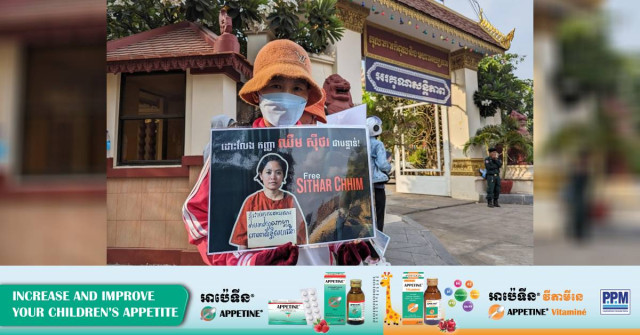Trans-Asia Travellers Find Friendship in Cambodia
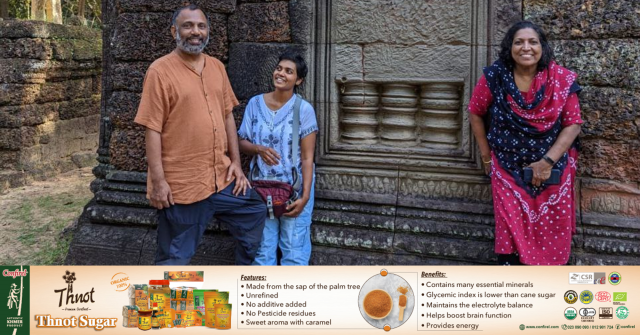
- By Ky Chamna
- December 5, 2023 7:00 PM
PHNOM PENH – For six months, an Indian family of three has travelled by car to 10 countries in Asia, including Cambodia, to experience the idea of “the world is one family”. Beginning in India, Lakshmi Dhuta, the daughter of the family, aims to visit 12 countries in total.
So, what motivates them? How did they prepare for the trip and what memorable experiences did they have in Cambodia?

Ky Chamna: To begin with, what prompted you to come up with this idea of traveling long distance?
Lakshmi Dhuta: Six months to be precise. Every country has their fair share of cultural heritage. As individuals, we cherish that uniqueness with the world.
That is also why we began our journey at Sree Swami Vaidya Gurukulam, a traditional healing ashram in Kerala that uses traditional treatment methods for maladies like knee ailments without surgery.
They practise the ancient system of Ayurveda, a science that is over 5,000 years old! We think of ourselves like cultural ambassadors, learning the best practices from countries we visit and sharing the knowledge with all.
In India, there’s a philosophy, ‘the world is one family’ and we have set out to experience that – to connect with our unseen kins and learn their ways of life.
We have a spiritual background too, our Master Sri Sudheer Vaidyar of Agastyashram was the one who guided us to a path of self-discovery through travel.
Ky Chamna: When travelling long distances like this, how do you support the trip financially? How do you find comfortable accommodation, good food and medical care? Is the language barrier an issue?
Lakshmi Dhuta: Unlike a lot of road trippers, we are not backed by sponsors. We are three regular people silently following our passion, backed by our soul friends.
My mother is a retired doctor and for the first decade of our trip, we used my mom’s pension corpus after retirement. This journey however, was made possible after my Guru, Shri Jayakumar decided to sell his house.
There’s a thought we believe in: Don’t hoard anything you can’t accept when your hands are full. In our kind of travel, we don’t eat three square meals a day. Sometimes we skip meals or eat fruit.
It is also expensive to eat out every day, so whenever possible, we look for accommodation with cooking options. A trip to the local market guarantees us local produce.
Honestly, the language is never a barrier. Translator apps help about 60 percent of our communication. Human emotions are fairly universal. We also communicate with gestures and say our gratitude in smiles.

Ky Chamna: You were mentioning the idea of "the world as one family" as well as your planned book titled "Mahavadhutam". Tell use more, especially about the name of the book? Does the book have any connection to the trip in particular?
Lakshmi Dhuta: The book is of a spiritual nature that talks through the lives of Avadhutas. It’s a special class of mystical saints, like the Hotei (Laughing Buddha) of China, Akka Mahadevi or Baba Neem Karori of India or the Diogenes of Greece.
The name of the book simply means, “the message of the Great Avadhutas” as it talks about the messages they imparted with their lives. Travel plays a very huge role in shaping our understanding of the cultural background, the timeline and the message. In India, we do interviews of people who had encounters with this class of saints, visit the places they’ve lived and so on.
Ky Chamna: How many countries have you visited so far and how many more do you wish to visit? How do you find Cambodian hospitality? Do you have any particular feeling or connection with Cambodia, a country which also deeply practises Hinduism?
Lakshmi Dhuta: Our goal is to experience 12 countries in this journey, of which we finished 10. Cambodians are warm people, always happy to help. The customs officers at the borders are the nicest we came across so far. In many aspects, Cambodia is closer to home.
The heritage of this beautiful country resonates a lot with our homeland. In India, there’s a sacred hill, rich with rare herbs called Maruthwamalai, not far from the place I was born. The legend says it was a bit that broke off from the Sanjeevani mountains, when Hanuman was carrying it to Sri Lanka.
When we arrive at Phnom Bok (Bok mountain), we hear the very same story for the mountain that stands out unusually in the topography. We come from the state of Kerala, where rice flakes are a part of cuisine (especially during harvest season) combined with palm jaggery and coconut.
The rest of India prepares it differently with spices but imagine our surprise when we see the ambok (rice flakes) during Bon Om Touk (the Water Festival in Cambodia), made exactly the way we are used to having it.
There are of course differences. Snakes are worshipped in India, but we came across them as fried street food, outside a temple premises. Something you’d never see in India. But when in Cambodia, we became Cambodians, so we dared to give it a try.
Ky Chamna: What are some of the unforgettable challenges that you have faced during your journey?
Lakshmi Dhuta: We had no friends in Cambodia when we came in. Our first friendship happened at the Moc Bai border when we were exiting the country to go to Vietnam. A hotel manager by the name Sopheak. We were unsure if Vietnam allows in foreign cars, as we’ve heard it’s a difficult process. But we decided to try nevertheless.
The big question was, where do we leave the car if it was denied entry? Mr Sopheak, whom we knew for thirty minutes said he will help. We trusted him too. When we re-entered Cambodia, we skipped lunch to have a meal with our friend.
Mr Sopheak, delighted to have us back, took us to his rooftop, and played Indian music, making it even more special. When we were leaving, both our rear tires got stuck in a ditch and the cogs of our electric car jack broke.
Within minutes, he called out a team and got us out, which would have been impossible if not for him. Challenges are part of the journey, maybe they exist to make us stronger; but we believe help is just around the corner.

Ky Chamna: When reaching each country, what do you hope to learn or visit from each particular place, let us say Cambodia, for example?
Lakshmi Dhuta: In Siem Reap, we lived at a homestay of Mr Sam, right next to a farm. Apart from his family, even his dogs were so happy to have us in their midst. We bonded so well that we shared a dinner together with a mix of both our cuisines.
These are the kind of memories or souvenirs we want to take back home. It was in the forests of Tatai, where we had our first gecko encounter. That night, for the first time, we slept to a “to-kay” lullaby. We also met Dr Suwanna Gauntlett, a crusader for wildlife protection who invited us for dinner. Two different cultures from two ends of the world at a table, over a common goal. To make the world a better place.
Cambodian people, their resilience through living a turbulent history and their gentle nature will always put a smile on our faces when we look back.






